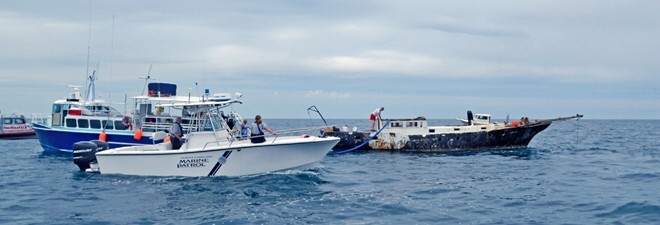
Legislature has stripped agency’s budget of $600,000 that federal agreement would have provided
The N.C. Division of Marine Fisheries continues to operate on a budget raided by the state legislature of $600,000 six months after Gov. Pat McCrory signed into law a Joint Enforcement Agreement that would earn the state’s saltwater management agency that amount in federal assistance.
The JEA has languished through the terms of office of two leaders of the N.C. Department of Environmental and Natural Resources, John Skvarla and now Donald R. van der Vaart.
When McCrory signed the 2014 budget act last Aug. 7, he approved a section that empowers the director of the NCDMF, Dr. Louis Daniel, to enter into a JEA with the National Marine Fisheries Service that would allow N.C. Marine Patrol officers to enforce federal fishing regulations beyond the state’s 3-mile offshore limit. But Daniel is still waiting for approval from van der Vaart, who hasn’t received a go-ahead from McCrory, who also failed to give Skvarla, who left the office on Dec. 2, instructions to go forward.
In the meantime, NCDMF’s operating budget has been slashed twice, and it’s still missing the $600,000 a JEA would provide.
Daniel confirmed the legislature held back nearly $600,000 from his agency the past two years, even after McCrory signed the budget bill and JEA directive into law. Joe Shute of Atlantic Beach, a member of the N.C. Marine Fisheries Commission that voted 6-1-2 in favor of accepting the JEA last year, believes legislators anticipated NCDMF receiving $600,000 in federal funds when they withheld $250,000 in 2014 and $300,000 this year.
Daniel would not confirm that the N.C. Marine Patrol has been limited in the amount of vehicle and vessel fuel it can use, but he admitted “a circumstance two years ago when we had to move money to the Marine Patrol,” and he admitted NCDMF is using older equipment instead of replacing it.
“We’re re-fitting and re-using vessels and doing a lot of work repairing vessels (that have been) in use for a while,” Daniel said. “Boats that have been in storage are on the water every day, but we don’t have any officers sitting home because of a lack (of funds).”
Chuck Laughridge of Harkers Island, another Commission member, agrees that NCDMF needs the JEA money.
“We could put the JEA (money) to use,” he said. “It’s money that we requested after the governor signed the budget act.”
A likely stumbling block is a letter signed by nearly two-dozen Republican legislators shortly after McCrory signed the budget agreement authorizing the JEA. Most represented coastal counties with commercial fishermen for constituents, but oddly enough, it’s not small-scale commercial fishermen who would be affected by a JEA because they don’t fish in federal waters.
However, large commercial-fishing operations with ocean-going vessels would likely be affected by such an agreement. Last month, for example, the NMFS charged 13 men, 12 from North Carolina, with illegally netting 90,000 pounds of striped bass worth $1.1 million in federal waters during 2010 and 2011.
Every state on the east coast — except North Carolina — has a JEA with the NMFS.




Be the first to comment